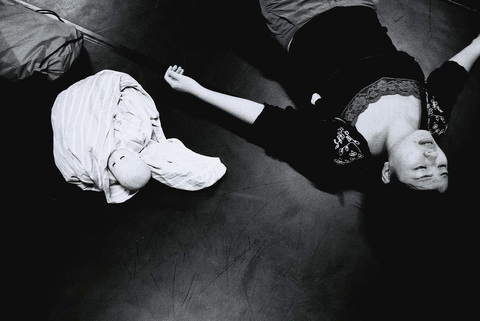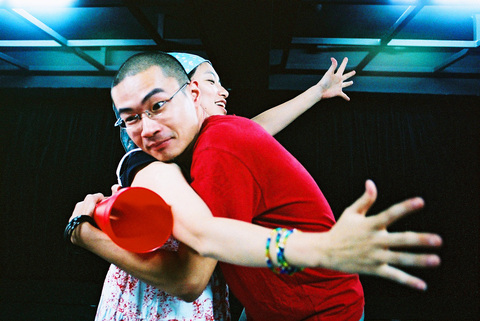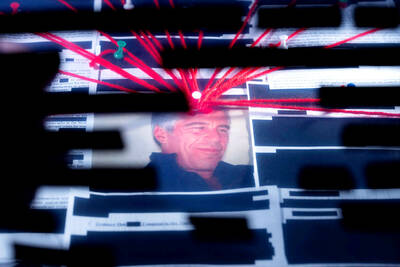Bertolt Brecht is one of the pre-eminent playwrights of the 20th century because he created a type of theater that was meant to provoke reflection based on reason rather than a visceral identification with the action on stage — something he felt left audiences complacent. For Brecht, this complacency left audiences ill equipped to deal with the troubles that pervade society; problems that he felt theater should address head on.
So Crazy Theater's (瘋狂劇場) production of The Caucasian Chalk Circle this weekend at The Crown Theater (皇冠藝文中心小劇場) is a considerable challenge. The play makes blatant attacks on religion, injustice and social inequality, and the themes that Brecht wrote so lucidly about half a century ago should still resonate, especially considering recent political events and the ongoing reforms of the legal system in Taiwan. But the question is, will they?
Producer William Wang (王瑋廉) and director Chou Li-de (周力德) have been students of Brecht for at least a decade, and bring their considerable insight into Brecht's ideas to the production. The name of the theater troupe also reflects their ideological commitment, drawing as it does from ideas expounded in Roland Barthes' Camera Lucida. Wang said that while Barthes talked about the need to make images inert to avoid the "madness" caused by the unreality of the thing represented, they conversely push toward madness to help them better understand society and stage better plays.

PHOTOS COURTESY OF CRAZY THEATER
The Caucasian Chalk Circle takes its name and part of its story from the book of a opera written during the Yuan Dynasty by Li Xing-dao (李行道). Brecht creates a play within a play, with the primary action taking place in the Caucasus Mountains of Georgia after WWII, where two groups of peasants gather in a valley to argue over which should claim the valley as their own. Under a government agency, it is decided that the land should go to the group who will put it to best use. A story is then recalled that 250 years previously a woman lost her daughter to the ravages of war and then tried to reclaim her from the maid that saved her.
As with Brecht's original productions, Crazy Theater does not use one actor for each part. Instead, eight actors play the role of 25 characters. Like the actors, the props and the set serve many functions the purpose of which, according to Wang, is to show the multifaceted nature of any object. So as with every actor playing different roles, each prop or set will have many functions. This of course plays into the theme of the multifaceted nature of justice.
The ideas of judgment should resonate with many Taiwanese because much of society's institutions and ideas are still based on tradition, which, according to Wang, can be a barrier to creating a civil society. With a translation into modern Chinese by Perng Ching-hsi (彭鏡禧), professor of modern languages at NTU, the audience should walk out of the theater with plenty to discuss. At least this is what Brecht would have hoped for.


For many centuries from the medieval to the early modern era, the island port of Hirado on the northwestern tip of Kyushu in Japan was the epicenter of piracy in East Asia. From bases in Hirado the notorious wokou (倭寇) terrorized Korea and China. They raided coastal towns, carrying off people into slavery and looting everything from grain to porcelain to bells in Buddhist temples. Kyushu itself operated a thriving trade with China in sulfur, a necessary ingredient of the gunpowder that powered militaries from Europe to Japan. Over time Hirado developed into a full service stop for pirates. Booty could

Politically charged thriller One Battle After Another won six prizes, including best picture, at the British Academy Film Awards on Sunday, building momentum ahead of Hollywood’s Academy Awards next month. Blues-steeped vampire epic Sinners and gothic horror story Frankenstein won three awards each, while Shakespearean family tragedy Hamnet won two including best British film. One Battle After Another, Paul Thomas Anderson’s explosive film about a group of revolutionaries in chaotic conflict with the state, won awards for directing, adapted screenplay, cinematography and editing, as well as for Sean Penn’s supporting performance as an obsessed military officer. “This is very overwhelming and wonderful,” Anderson

Social media addiction has been compared to casinos, opioids and cigarettes. While there’s some debate among experts about the line between overuse and addiction, and whether social media can cause the latter, there is no doubt that many people feel like they can’t escape the pull of Instagram, TikTok, Snapchat and other platforms. The companies that designed your favorite apps have an incentive to keep you glued to them so they can serve up ads that make them billions of dollars in revenue. Resisting the pull of the endless scroll, the dopamine hits from short-form videos and the ego boost and validation

When sifting through the seemingly endless collection of documents in the Epstein files gets to be too much and Ellie Leonard needs a break, she takes a walk outside. Then it’s back to the computer. The New Jersey mother of four is among hundreds of citizen-journalists, or sleuths, absorbed by the material connected to the late Jeffrey Epstein. She’s determined to learn the stories behind his illicit sex ring and relationships with some of the world’s most powerful people, and publish what she finds on Substack. “I like a good puzzle,” Leonard said. “I like an investigation. I like things that we